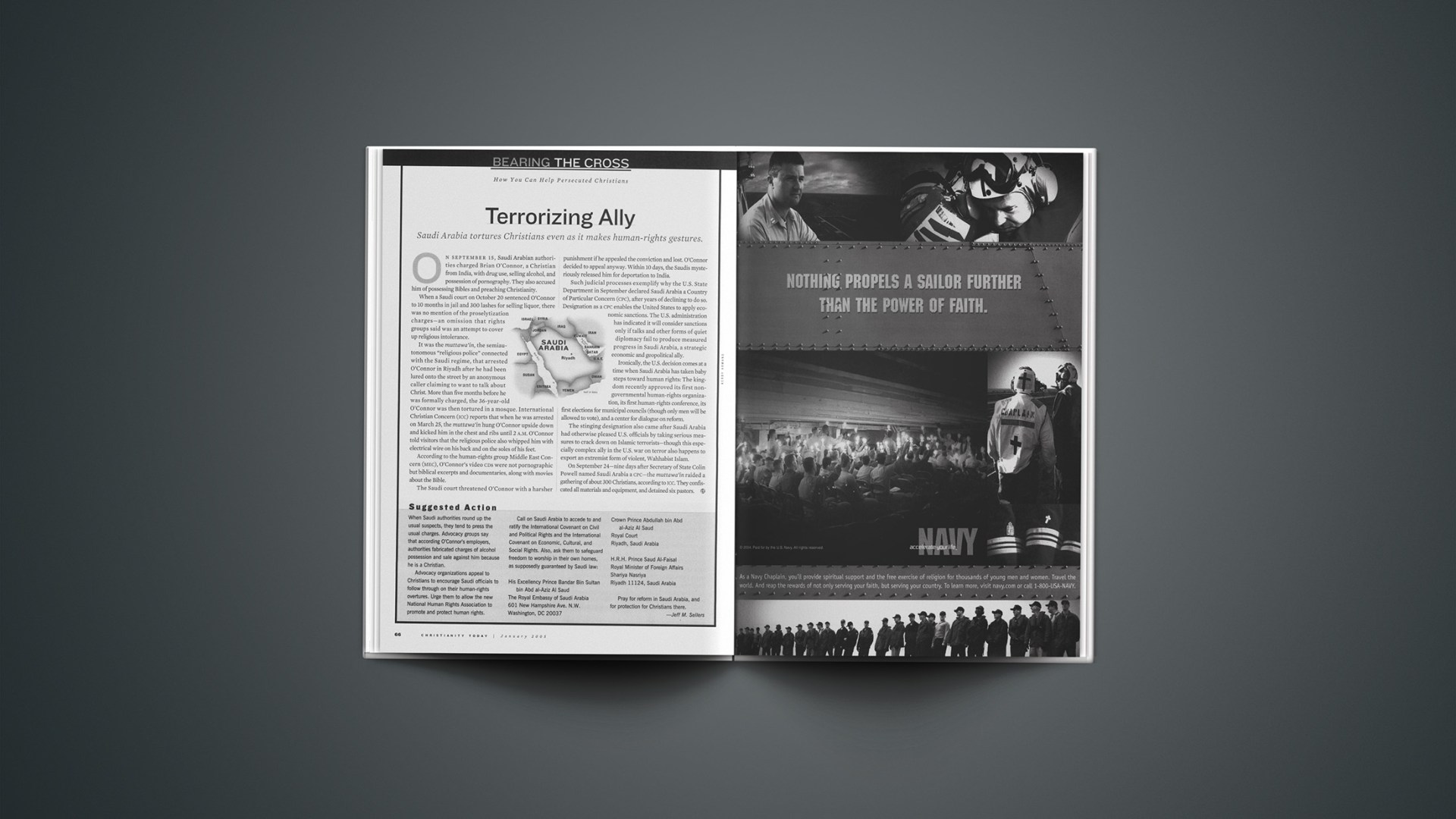On September 15, Saudi Arabian authorities charged Brian O’Connor, a Christian from India, with drug use, selling alcohol, and possession of pornography. They also accused him of possessing Bibles and preaching Christianity.
When a Saudi court on October 20 sentenced O’Connor to 10 months in jail and 300 lashes for selling liquor, there was no mention of the proselytization charges-an omission that rights groups said was an attempt to cover up religious intolerance.
It was the muttawa’in, the semiautonomous “religious police” connected with the Saudi regime, that arrested O’Connor in Riyadh after he had been lured onto the street by an anonymous caller claiming to want to talk about Christ. More than five months before he was formally charged, the 36-year-old O’Connor was then tortured in a mosque. International Christian Concern (ICC) reports that when he was arrested on March 25, the muttawa’in hung O’Connor upside down and kicked him in the chest and ribs until 2 a.m. O’Connor told visitors that the religious police also whipped him with electrical wire on his back and on the soles of his feet.
According to the human-rights group Middle East Concern (MEC), O’Connor’s video cds were not pornographic but biblical excerpts and documentaries, along with movies about the Bible.
The Saudi court threatened O’Connor with a harsher punishment if he appealed the conviction and lost. O’Connor decided to appeal anyway. Within 10 days, the Saudis mysteriously released him for deportation to India.
Such judicial processes exemplify why the U.S. State Department in September declared Saudi Arabia a Country of Particular Concern (CPC), after years of declining to do so. Designation as a cpc enables the United States to apply economic sanctions. The U.S. administration has indicated it will consider sanctions only if talks and other forms of quiet diplomacy fail to produce measured progress in Saudi Arabia, a strategic economic and geopolitical ally.
Ironically, the U.S. decision comes at a time when Saudi Arabia has taken baby steps toward human rights: The kingdom recently approved its first nongovernmental human-rights organization, its first human-rights conference, its first elections for municipal councils (though only men will be allowed to vote), and a center for dialogue on reform.
The stinging designation also came after Saudi Arabia had otherwise pleased U.S. officials by taking serious measures to crack down on Islamic terrorists—though this especially complex ally in the U.S. war on terror also happens to export an extremist form of violent, Wahhabist Islam.
On September 24—nine days after Secretary of State Colin Powell named Saudi Arabia a CPC—the muttawa’in raided a gathering of about 300 Christians, according to ICC. They confiscated all materials and equipment, and detained six pastors.
Suggested ActionWhen Saudi authorities round up the usual suspects, they tend to press the usual charges. Advocacy groups say that according O’Connor’s employers, authorities fabricated charges of alcohol possession and sale against him because he is a Christian. Advocacy organizations appeal to Christians to encourage Saudi officials to follow through on their human-rights overtures. Urge them to allow the new National Human Rights Association to promote and protect human rights. Call on Saudi Arabia to accede to and ratify the International Covenant on Civil and Political Rights and the International Covenant on Economic, Cultural, and Social Rights. Also, ask them to safeguard freedom to worship in their own homes, as supposedly guaranteed by Saudi law: His Excellency Prince Bandar Bin Sultan bin Abd al-Aziz Al Saud The Royal Embassy of Saudi Arabia 601 New Hampshire Ave. N.W. Washington, DC 20037 Crown Prince Abdullah bin Abd al-Aziz Al Saud Royal Court Riyadh, Saudi Arabia H.R.H. Prince Saud Al-Faisal Royal Minister of Foreign Affairs Shariya Nasriya Riyadh 11124, Saudi Arabia Pray for reform in Saudi Arabia, and for protection for Christians there. —Jeff M. Sellers |
Copyright © 2005 Christianity Today. Click for reprint information.










